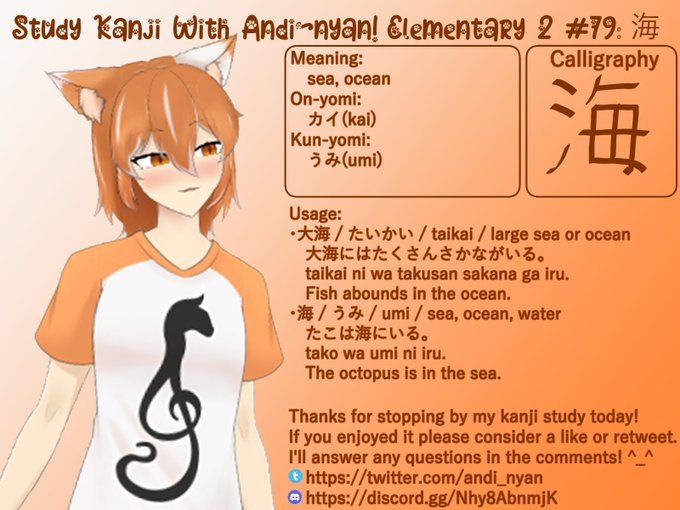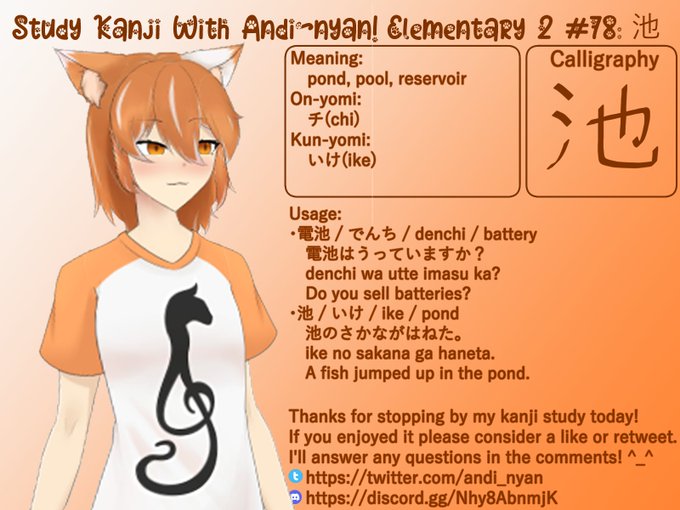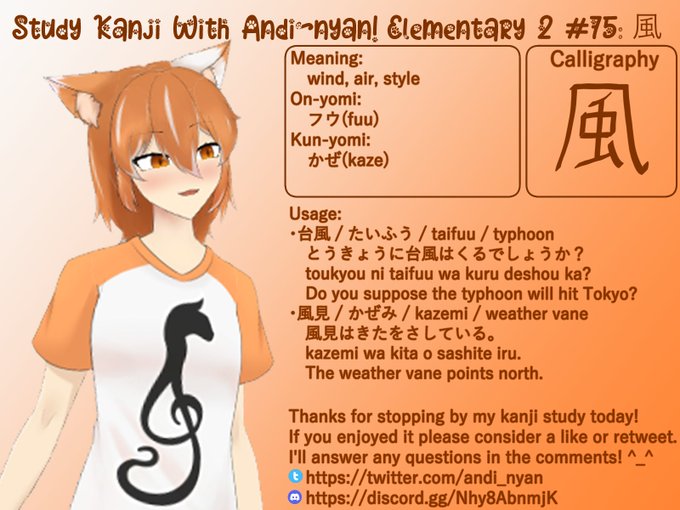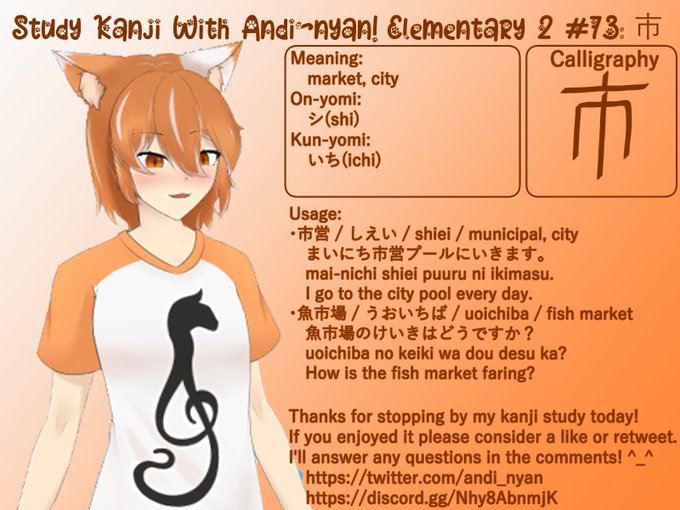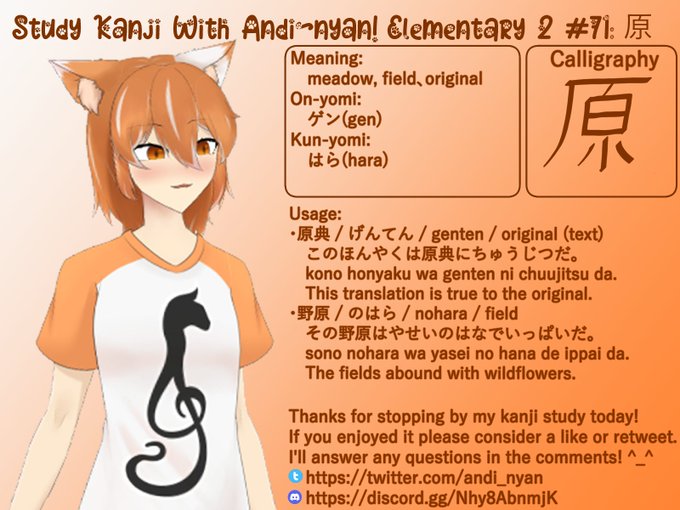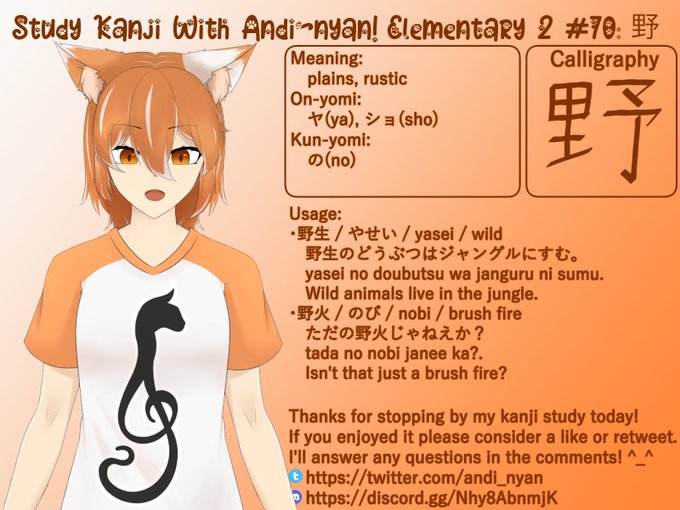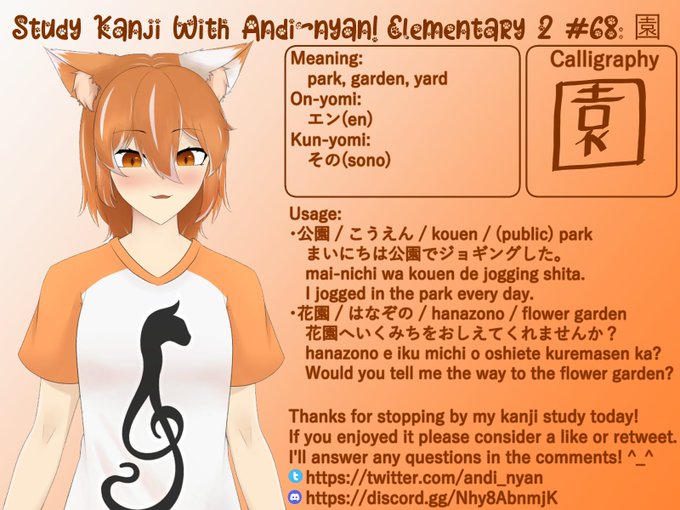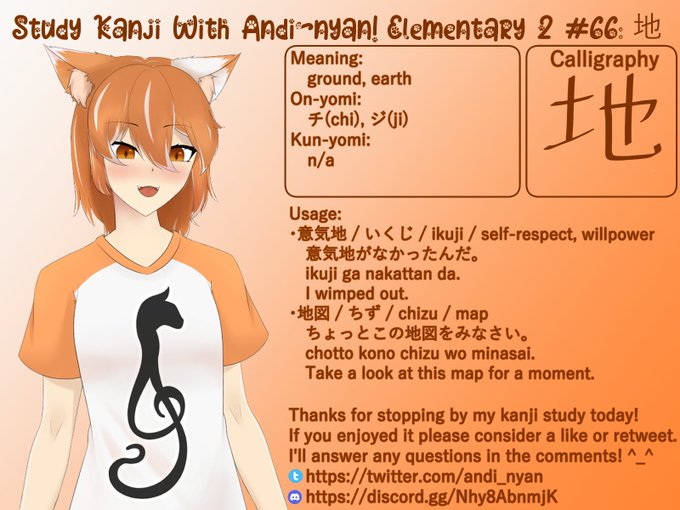kanjistudyのTwitterイラスト検索結果。 141 件中 3ページ目
ようこそ! My #kanjistudy for today is 家, house/home!
This is a pretty hard kanji for me to remember, but it's made up of 宀 (roof) and 豕 (pig), and people raised pigs at their houses.
So there's how you can remember it more easily! ^_^
またあした!
#ENVtuber #VtuberTwP
Good afternyan! Today's #kanjistudy features 戸, door! It's also used as a counter for houses.
Note on counters: Japanese has certain characters which are used to 'count' the number of a certain kind of something, i.e. 3戸 = 3 houses.
またあした!
#ENVtuber #VtuberTwP
ようこそ! Here's my #kanjistudy for today, featuring 室, room.
This appears to be a kanji where the kun-yomi reading has (mostly) fallen out of general usage. The on-yomi reading appears to get used a lot!
Thanks for coming and I'll see you tomorrow!
#ENVtuber #VtuberTwP
Good afternyan, and here's my #kanjistudy for today, featuring 星, star!
I remember this kanji well since it includes both 日(sun) and 生(life), so "living sun". Stars twinkle after all. ^_~
The next tweet will have notes on the planet names.
にゃりがとう!
#ENVtuber #VtuberTwP
Welcome to my #kanjistudy! Today is the halfway point in Elementary 2, meaning I've covered 160 kanji, and features 岩, boulder or cliff!
I usually think of this based on its elements 山 (mountain) and 石 (stone), so mountainous stone.
See you tomorrow!
#ENVtuber #VtuberTwP
Good afternyan and ようこそ (welcome) to my #kanjistudy! Today is 海, sea!
What's the first thing you think of when someone mentions the sea? For me, it's fish (and seafood in general). ^_~
にゃりがとう! またあした (thanks and until tomorrow)!
#ENVtuber #VtuberTwP
Good afternyan! My #kanjistudy for the day is 池, pond!
I find it quite cool that this was used to make the word 電池 (denchi), battery. Given the ubiquitous nature of technology, batteries are everywhere in our society.
Thanks for stopping by! またにゃ!
#ENVtuber #VtuberTwP
Good afternyan, and ようこそ (welcome) to my #kanjistudy! Today features 雲, cloud!
I couldn't actually find any sentences using the on-yomi reading ウン; this kanji looks like it mainly uses the kun-yomi reading.
Thanks for stopping by, またあした, にゃ!
#ENVtuber #VtuberTwP
Good afternyan, and here's my #kanjistudy for today: 風, wind!
This originally depicted a bird of paradise, but as you can see, it's much simpler today.
I always visualize this as a 虫 (insect) being carried aloft by the wind.
Until tomorrow, またにゃ!
#ENVtuber #VtuberTwP
Good afternyan! My #kanjistudy today is 京, capital!
I don't think this kanji is used for anything but names anymore, such as 東京 (Tokyo) and 京都 (Kyoto).
I remember this kanji as a fancy pavilion, the kind a ruler would sit in.
にゃりがとう! また明日!
#ENVtuber #VtuberTwP
Good afternyan, and ようこそ(welcome) to my #kanjistudy! Today is 市, market/city!
It originally meant market, but this kanji is used to refer to cities, such as 市民 (city inhabitant), 都市 (municipal), and 市街 (urban area).
またあした (until tomorrow)!
#ENVtuber #VtuberTwP
Good afternyan! My #kanjistudy today is 里, ri!
This is an archaic unit of distance as noted on the PNG, and is also used to refer to rural areas since cities are densely packed.
Fun fact, this is analogous to the archaic term league, 3 miles.
またあした!
#ENVtuber #VtuberTwP
Good afternyan! My #kanjistudy for today is 原, meadow!
The etymology of this kanji is "spring water flowing out of a basin", which is really poetic. So I think this kanji grew from that meaning to refer to the plants which grow around it. ^_^
またあした!
#ENVtuber #VtuberTwP
ようこそ! My #kanjistudy today is on 野, plains/rustic!
The first character in this kanji comes from 田, (rice) field, and 土, ground. So it follows that this kanji has something to do with fields/ground, and so it does. ^_^
にゃりがとう! みゃたあした!
#ENVtuber #VTuberTwP
Good afternyan and welcome to my #kanjistudy! Today I'm featuring 谷, valley!
I love the symbolism of this kanji. To me, it looks like clouds above a mountain above a 'gap' which is the valley.
Thanks for stopping by! また明日!
#ENVtuber #VtuberTwP
Happy noontime! My #kanjistudy for today is 園, park!
One thing I found with this kanji is that the on-yomi reading エン(en) is far more common than the kun-yomi reading その(sono).
Thanks for stopping by! またにゃ!
#ENVtuber #VtuberTwP
ようこそ! My #kanjistudy today is on 国, country!
Heard of the game series "Ni no Kuni"? It uses this kanji. I also like the component breakdown - a jewel 玉 inside a border.
にゃりがと, みんや! またにゃ!
#ENVtuber #VtuberTwP
こんいちにゃ and welcome to my #kanjistudy. Today I'm covering 地, earth!
Note that 土, ground, is in this kanji, and the relationship between ground and earth.
Other radicals convey the same idea of being part of a kanji.
にゃりがと, みんや! またにゃ!
#ENVtuber #VtuberTwP
Good afternoon and welcome to my #kanjistudy. Today I'm featuring 場, place!
This kanji is pretty challenging for me, ngl. The bottom-right strokes are really tough to remember.
You can remember this kanji with 土 (ground) and 易 (place).
またにゃ!
#ENVtuber #VtuberTwP
Welcome to my #kanjistudy! Today I'm covering 外, outside!
This one is a bit tricky to remember; neither component is distinctive. But one of them is 夕, evening, so I remember it as "a person being outside in the evening".
にゃりがと, またにゃ!
#ENVtuber #VtuberTwP






